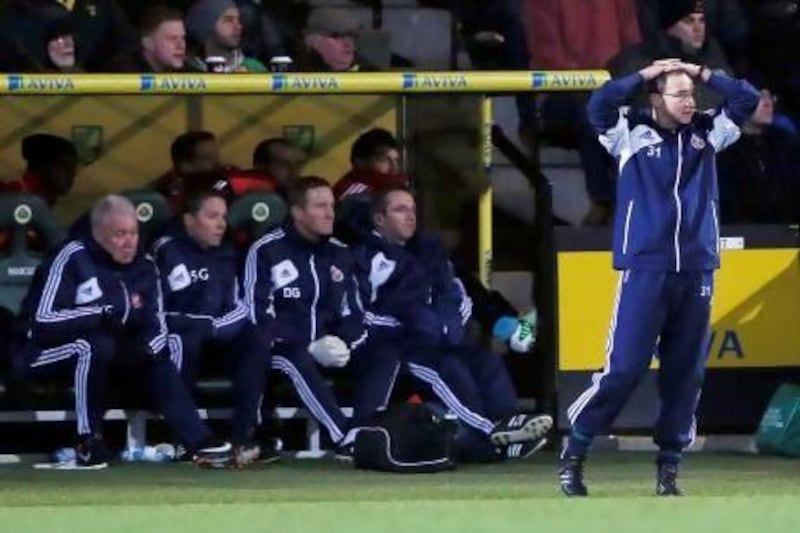It is the nature of managers that when they deliver a statement of the obvious it still provides a headline.
And so it was on Sunday when Martin O'Neill proclaimed that, unless Sunderland started picking up rather more points they are in a relegation battle.
Of course they are. Sunderland have won two of their past 22 English Premier League games, both against teams reduced to 10 men. They haven't beaten a top-flight team with a full complement of players since March.
They are among the league's lowest scorers and have had the fewest shots on target of anyone in the division. They have played two games against sides who could be in the relegation shake-up – underachieving Queens Park Rangers and overachieving Norwich City, now pulling clear of danger – and taken a solitary point.
They are statistics that should have the warning lights flashing. The context is so alarming that individual tales of misfortune pale into insignificance.
Granted, at Norwich, on Sunday, Sunderland spurned an open goal, had a narrowly offside goal disallowed and encountered a Norwich goalkeeper, Mark Bunn, in fine form. They also produced an abject first-half display, one that appeared to bemuse O'Neill.
Yet, while there were rumours he offered his resignation 10 days ago, if there are few calling for the Northern Irishman's head, it is unsurprising. He can seem an eccentric, engaging insurance policy against relegation.
He has only once finished a full season in the bottom half of the Premier League and that was in the respectability of 11th place.
Parachuted in, he rescued Sunderland from a worse predicament 12 months ago. He has a deserved reputation as one of the finest British managers of his generation.
And yet it is worth pondering how many of Sunderland's troubles are attributable to him. Bouncing up and down on the touchline with boundless energy, O'Neill hardly appears an eminence grise of the game.
But he is now 60 and just as out-of-form players in their 30s face questions if they are in terminal decline, the same can be asked of managers twice their age.
There are marked similarities to his time at Aston Villa: midfielders are still selected at full-back, squad rotation is non-existent, with fringe players marginalised.
And O'Neill buys only British or from British clubs.
The formula has not changed. The results have.
Managers who rarely recruit abroad are condemned to paying the inflated prices of the domestic transfer market.
Steven Fletcher's £12 million (Dh70.6m) cost was mocked before his early flurry of goals but Adam Johnson is yet to justify his £10m fee. It is a reality that expenditure increases expectations but Sunderland have regressed despite spending.
With the creative contingent of Johnson, James McClean and Stephane Sessegnon all underperforming to varying degrees, Sunderland have often been sterile.
The 3-1 win at Fulham was a welcome exception but sides managed by a motivator of O'Neill's calibre have rarely seemed so flat.
One theory is that the team lacks quality. Compared to most others in the lower half of the Premier League, however, it should not.
Both O'Neill and his predecessor, Steve Bruce, have been allowed to invest, the latter because of the profitable sales of Darren Bent and Jordan Henderson. There are players with enviable CVs and sizeable salaries.
Yet Sunderland seem less than the sum of their parts. They are becoming the antithesis of O'Neill's Leicester City team, a group of unlikely lads with a genuine hunger, compiled by brilliant bargain-hunting after plenty of trawling through the lower leagues for signings.
They achieved four successive top-10 finishes and reached three cup finals, winning two, between 1995 and 2000. O'Neill's defining achievements as a manager in England came at Filbert Street but the fact it is 12 years since he left Leicester suggests his best days may be behind him.
Certainly, John Robertson, the long-serving assistant who helped him at Wycombe Wanderers, Leicester, Celtic and Villa is no longer by his side after deciding not to join him at the Stadium of Light.
They were European Cup winners together as Nottingham Forest players but if the unpredictable, charismatic O'Neill was the Brian Clough of the partnership, perhaps the quieter Robertson was his Peter Taylor, the irreplaceable sidekick.
Perhaps, instead, the problem is Sunderland. Whoever the manager, extended slumps have pockmarked their recent seasons.
O'Neill won nine of his first 16 league games, but before then Sunderland had only won five in 28 under Bruce and the caretaker Eric Black.
They had a run of just three wins in 20 under Ricky Sbragia, and two in 18 under Roy Keane. All have had expensively assembled squads but none has had the managerial pedigree of O'Neill.
If his appointment appeared auspicious, it is worth remembering that Lawrie McMenemy and Howard Wilkinson also arrived on Wearside with distinguished records. Each, it soon transpired, was past his peak and utterly unsuitable for the club.
O'Neill, a lifelong Sunderland supporter with seemingly transferable methods, looked a far better fit. But after the initial upsurge, when McClean and Sessegnon kept scoring glorious goals, Sunderland have suffered a relapse.
If their plight is unprecedented for O'Neill, it is all too familiar for the club.
Follow us
[ @SprtNationalUAE ]






